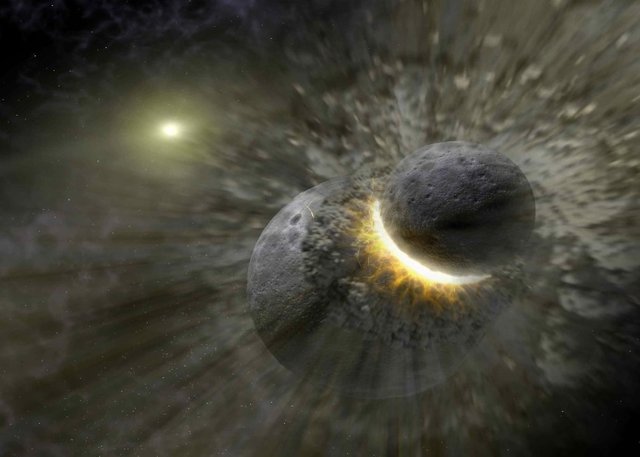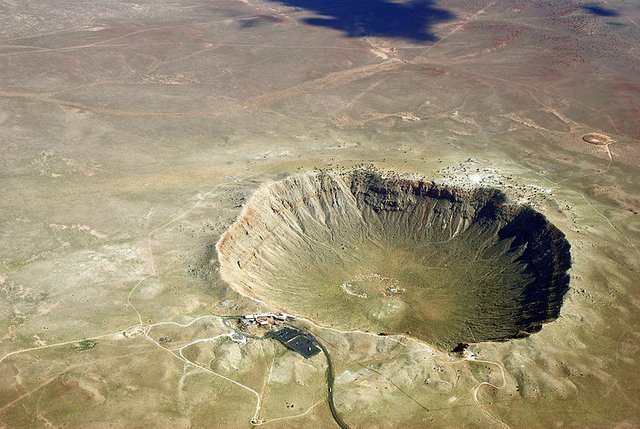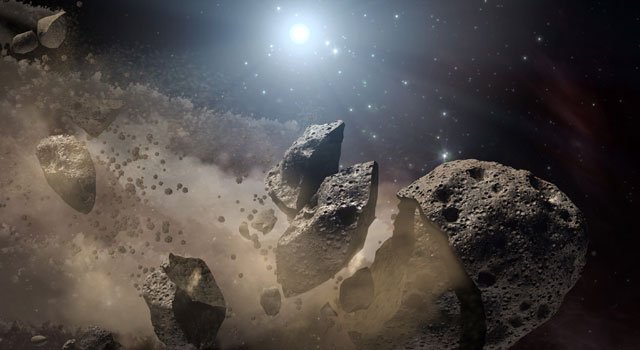What Is The Likelihood That A Comet/Asteroid Will Strike The Earth?
In what seems to be a sheer transcendental coincidence in abstract realms while growing up as a child, I could remember that I used to go wild in my imaginations sometimes. "What if a huge rock falls from sky on a populated area🤔🤔?, I would think in one occasion. And in another occasion, I might be in a church auditorium with hundreds of other people, and the thought went again, "What if such a huge rock falls on this auditorium and kill all of us?!". 😂😂Weird thoughts like these used to occupy my mind long before I heard the term asteroid and more recently comet, and yet I never knew there is an inkling of truth in them.

Source: NASA image used under public domain license
So what does this tells us? Thoughts like these constitute a practical example that no single individual has a monopoly of knowledge. That Benjamin Franklin discovered electricity doesn't mean if he hadn't, no one would. While one may rightly argue that mine has no established evidence, but that's unarguably how intelligent questions that lead to formation of hypothesis used to begin. That said, before I dive into the core of this article, it's important we understand the differences in the properties of the terms — comet and asteroid — forming the crux of this article.
Asteroids are generally considered to be made up of metals and rocky material, while comets are made up of ice, dust and rocky material. Both asteroids and comets were formed during the earliest history of the solar system, around 4.5 billion years ago. Asteroids formed much closer to the sun, where it was too warm for ices to remain solid. Comets formed farther from the sun where ices would not melt. Comets, which approach the sun, lose material with each orbit because some of their ice melts and vaporizes to form a tail.||Source
The terms asteroid and comet are astronomically distinctive, but for the purpose of this article, however, we are going to be using them interchangeably to refer to any celestially produced rocky body winding about within the milky-way galaxy in the lower Earth orbitals and is capable of hitting the earth surface and potentially smashing through the atmospheric obstructions with possibility to wreck havoc among human populations. Having said that, looking at the title of this article, it is a matter of fact that Earth is being bombarded every now and then by varying sizes of different celestial bodies including asteroids, comets, meteors, and other space debris. But they are usually destroyed on impact with atmospheric obstructions.

Ariel View of a meteocrater
Source: Wikimedia commons. Authored by Shane.torgerson under CC BY 3.0 license
However, the likelihood that any one of these cosmic bodies would make it through the atmospheric obstructions and inflict damages on human populations is dependent on the its size. The bigger the size, the less likely it would hit the Earth. Nevertheless, that doesn't eliminate the possibility altogether. There is extensive evidence showing that Earth has been severally hit by asteroids throughout history and even in the recent times. Let's take a look at some reported cases.
Taking a look at past occurrences in relation to diameter
Just this last year, there was an incident of a huge fireball meteor that was reported to have lighted up sky over Illinois. It was said to be the size of a car, and was discovered to be a small celestial body with a diameter of 1 meter. Celestial bodies of this size usually hit the Earth severally every year but hardly make the news because they don't pose any danger. An asteroid or any of such celestial bodies has to measure 10 - 15 meters in diameter to start to pose any danger.
In 2013, an asteroid measuring about 20 meters was reported to have hit close to the Russian city of Chelyabinsk. By the time everything settled, about 1800 people were left injured and many buildings, damaged. The likelihood of object of this type hitting the Earth is estimated to be once in 50 years with impact energy that's equivalent to 500 Kilotons of TNT — trinitrotoluene.
There was this 1908 case that struck Tunguska, Siberia, with a hydrogen bomb explosion-equivalent of about 3 — 5 Megatons of TNT. It was said to have destroyed a farmland of 830 square miles, felled about 80 million trees and caused an earthquake of about 5.0 magnitude. Its diameter was estimated to range 60 — 150 meters. The devastation was enormous! And its impact remains the largest in recorded history. The likelihood of event of this nature happening is put at once every 300 — 1000 years. Scientists believe that the Chicxulub crater found in the Gulf of Mexico must have been caused by an asteroid with a diameter of 10 kilometers and must have been responsible for the wiping out of dinosaurs some 65 million years agoref.

Dinosaur-killing asteroid representation
Source: NASA image used under public domain licence
Even though it has been said that larger impacts are more rarer, and going by the current rate, Earth would probably not be hit by a large impact asteroid in this century and even the next, however, the report of the observed apophis asteroidref,which is expected to speed pass the Earth in 2029 and 2036 with a high probability of impact, seems to contradict this. If fact, for as long as those rocky bodies are still up there, there is no ruling out that one day our planet will be hit by another asteroid.
It is for these reasons that year in year out, efforts are being made to improve the ability and precision of the existing astronomical survey telescope to detect asteroids and comets that could potentially pose a threat to our planet. Early detection would enable scientists to fashion out appropriate responses in time to contain the threat posed by killer asteroids. RESPECT!
Source references
- What's the chance of an asteroid hitting Earth and how do astronomers calculate it?
- What is the likelihood that a comet will strike the Earth? Can we detect and stop it?
- What are the chances of an asteroid or a comet hitting the Earth in this century?
- What's the difference between asteroids and comets?
- Impact of asteroid that will approach Earth in 2029, cannot be ruled out
Wow! This is scary! Don't tell me we are living on a precipice?
However, I really admire your writing style. Little wonder your posts have been consistently featured in @stemng weekly report. Keep it up and congratulations.
Wow! This is scary! Don't tell me we are living on a precipice?
However, I really admire your writing style. Little wonder your posts have been consistently featured in @stemng weekly report. Keep it up and congratulations.
Lols thanks Ogami. Bless you sir.
I had the chance to view the Meteor Crater site with my own eyes. However, not from the sky :)
Personally, I really think a solution will be found in case of a too large impact probability. Technology will help us! ;0
Lols you are here. As scary as this is I am quite confident solutions are being developed to protect the Earth as embedded in the context of this post.
Wishing you best of luck with the meet up.
Hey @olamseu great piece sir. Keep it up.
I guess the meet up has been held already.
Thanks for visiting and the complement.
Yep, I was actually already back 2 days ago. But the meetup was super nice ^^
Delighted to see you here. Thanks. Great to Know you are witness to the crater. Of course we have evolved to such an extent that we will deploy every means to safeguard our lovely Earth from destructive cosmic bodies.
I do hope the meet up was successful and a lot learnt. Thank you
I don't know if I will have the time to write a summary post about the meetup, but I will try. Maybe some physics post first :)
This post has been voted on by the steemstem curation team and voting trail.
There is more to SteemSTEM than just writing posts, check here for some more tips on being a community member. You can also join our discord here to get to know the rest of the community!
This post has been upvoted by the user-run curation platform CI! In this platform users are able to manually curate content. This is done regardless of Steem Power, for both rewards and vote size calculation.
Join in at our site here!
https://collectiveintelligence.red/
Or join us on discord to interact with the community!
https://discord.gg/sx6dYxt
This post was submitted for curation by: @anevolvedmonkey
This post was given a rating of: 0.9931741726813891
This post was voted: 100%